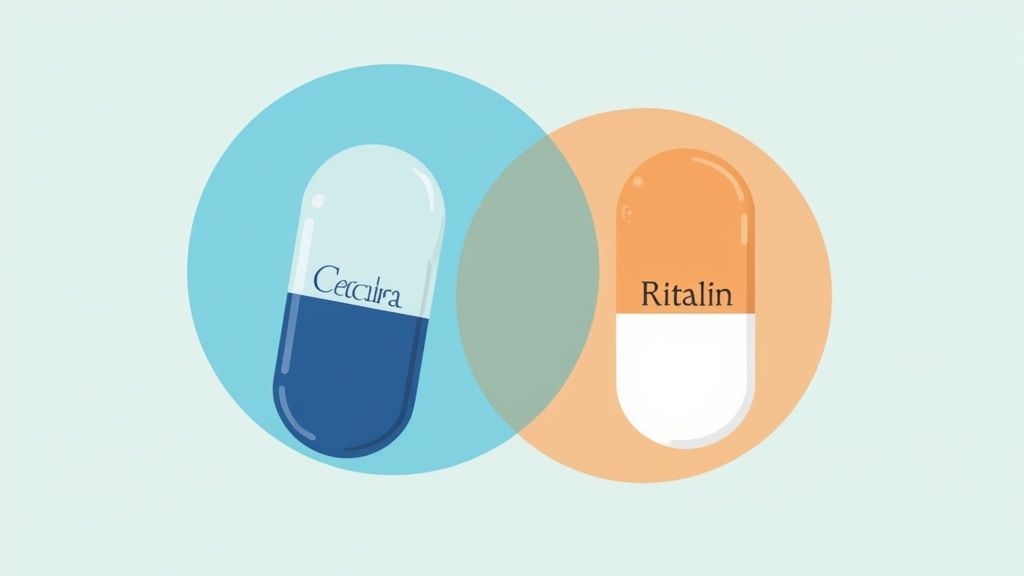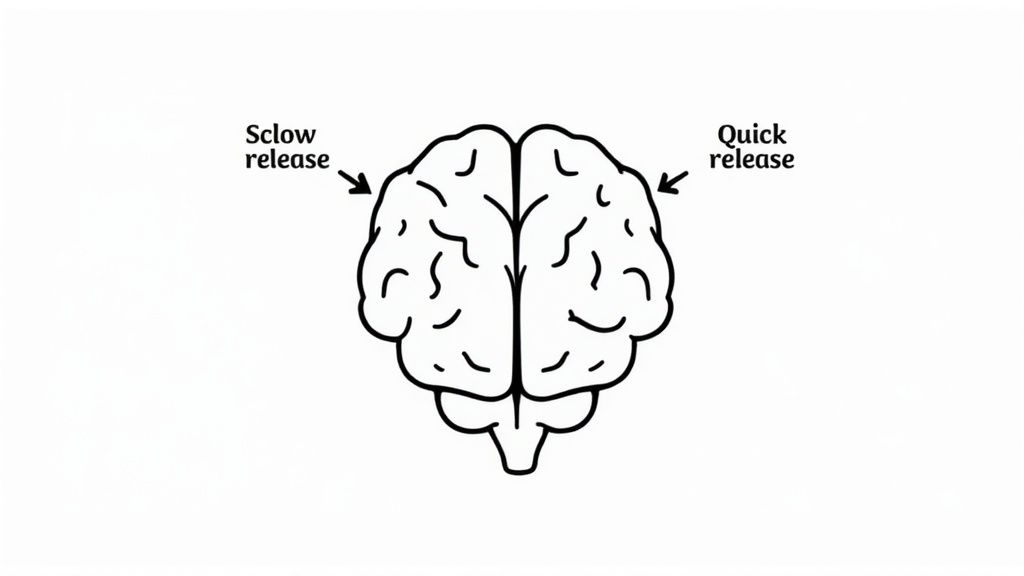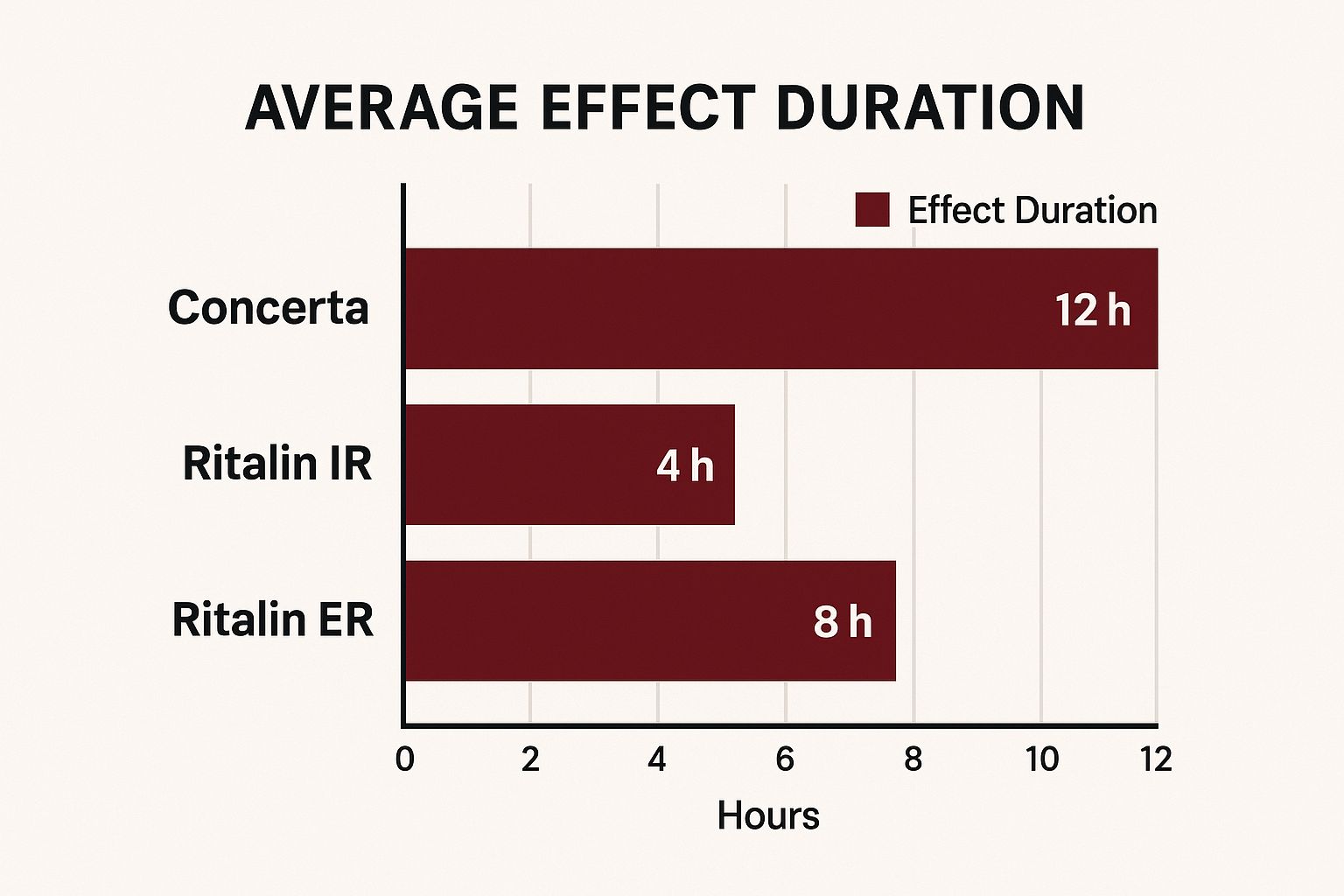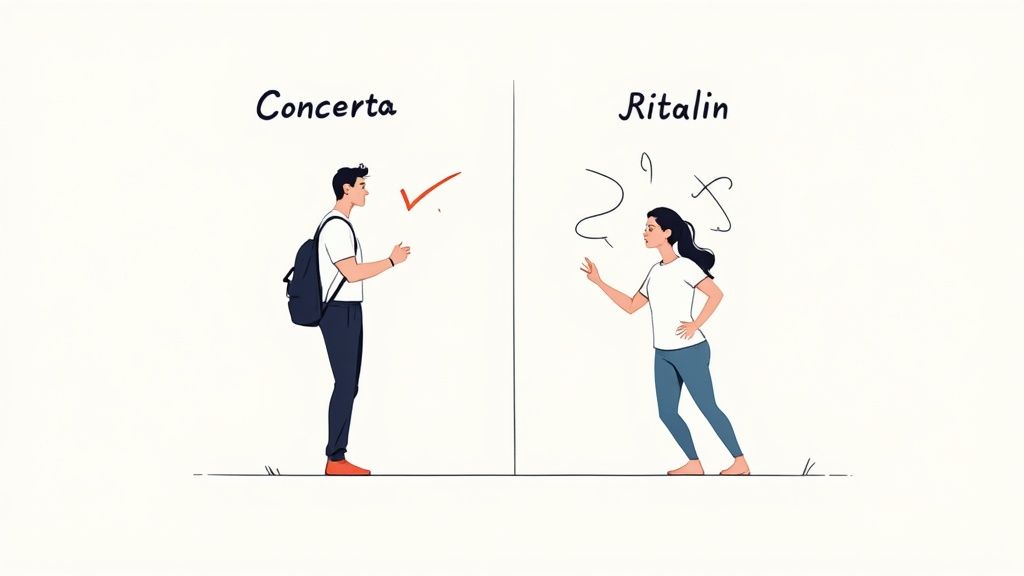When you're looking at Concerta vs. Ritalin, the conversation really boils down to one crucial factor: how the medication is delivered to your system. It's a common point of confusion because both use the exact same active ingredient, methylphenidate. The real difference is that Ritalin gives you immediate, short-acting relief that requires a few doses throughout the day, while Concerta is designed for steady, all-day symptom control from a single morning pill.
So, the choice isn't about which one is "better" in a general sense. It’s about which dosing style fits your life, your schedule, and your specific needs.
Understanding the Core Differences
At their core, both Concerta and Ritalin are central nervous system stimulants. They’re prescribed to help manage the effects of Attention Deficit Hyperactivity Disorder (ADHD) by increasing levels of two key brain chemicals, dopamine and norepinephrine. These are the neurotransmitters that help regulate things like focus, attention, and impulse control.
But even with the same active ingredient, the way they release it creates two completely different experiences. The debate isn't about which one is "stronger," but about how each one integrates into a person's daily life. That's why getting a clear, side-by-side look at their features is the first step toward having an informed conversation with your doctor.
At a Glance Comparison Concerta vs Ritalin
To make things simple, here’s a quick breakdown of what sets these two medications apart.
| Feature | Concerta | Ritalin (Immediate-Release) |
|---|---|---|
| Active Ingredient | Methylphenidate | Methylphenidate |
| Release Mechanism | Extended-release (slow, steady delivery) | Immediate-release (fast-acting) |
| Duration of Effect | 10-12 hours | 3-4 hours |
| Dosing Schedule | Once daily, in the morning | 2-3 times per day |
| Primary Advantage | All-day coverage, convenience | Flexibility in dosing, fast onset |
| Best For | School-aged children, adults needing consistent, full-day focus without midday dosing. | Individuals needing short bursts of focus or those sensitive to long-acting medication. |
This table really highlights the fundamental trade-off. You're choosing between the convenience of one-and-done or the flexibility of as-needed.
The choice often comes down to lifestyle. A student who cannot visit the nurse's office for a midday dose might benefit from Concerta's one-and-done approach. In contrast, an adult who only needs help with focus for a few hours in the afternoon may prefer the flexibility of immediate-release Ritalin.
This core difference in how long the medication lasts and how it's delivered impacts everything—from managing side effects to simply planning your day. Grasping this distinction is the key to figuring out which path might be the right one to explore with your healthcare provider.
How Methylphenidate Works for ADHD
Before we can really get into the nitty-gritty of Concerta versus Ritalin, it’s important to understand the science they're both built on. The active ingredient in both medications is methylphenidate, a central nervous system stimulant that’s been a go-to for treating Attention Deficit Hyperactivity Disorder (ADHD) for decades. Its main job is to help rebalance key chemicals in the brain.
Methylphenidate works by making two critical neurotransmitters—dopamine and norepinephrine—more available in the brain. Think of these as the brain's messengers, responsible for crucial executive functions like attention, impulse control, and organization. These are the very areas where someone with ADHD often runs into roadblocks.
Picture the brain's communication network as a busy city intersection. In a brain with ADHD, the traffic signals can be out of sync, causing jams and making it hard to focus on a single destination. Methylphenidate steps in like a skilled traffic controller, restoring order and allowing signals to flow smoothly and efficiently between brain cells.
Targeting the Core Symptoms
By giving dopamine and norepinephrine levels a boost, methylphenidate gets right to the neurological heart of ADHD symptoms. This chemical recalibration leads to noticeable improvements in:
- Sustained Attention: The ability to lock in and focus on tasks for longer stretches.
- Impulse Control: Putting the brakes on hasty decisions and actions.
- Hyperactivity: Helping the mind and body find a sense of calm.
This is why a stimulant medication can have a paradoxically calming and focusing effect on a person with ADHD. It doesn't over-stimulate; instead, it brings brain activity to a more optimal, functional level. This reduces the internal "noise" that often leads to self-stimulation through fidgeting or impulsive behavior. For more context on how these symptoms are officially evaluated, you can review the formal ADHD diagnostic criteria.
The real function of methylphenidate isn’t just to stimulate—it’s to regulate. By correcting a neurochemical imbalance, it empowers the brain’s executive functions to work as they should, creating a stable foundation for tackling daily life.
The widespread use of methylphenidate speaks volumes. The global market for medications containing it, like Concerta and Ritalin, was recently valued at around USD 5.2 billion. This figure is only expected to grow, largely due to better awareness and diagnosis of ADHD, which affects an estimated 5% of children worldwide.
So, if both drugs use the same powerful ingredient, what's the big deal? The core difference, and the entire reason for the Concerta vs. Ritalin debate, comes down to how they release that ingredient into your system. This delivery mechanism is what creates a totally different experience for the user and ultimately steers the decision.
Comparing Dosing Schedules and Duration of Action
When you get down to it, the single biggest difference between Concerta and Ritalin is how they deliver the medication into your system. This isn't just a technical detail—it completely changes how the medicine fits into your day-to-day life. The choice really boils down to what you need: steady, all-day coverage or shorter, more flexible periods of focus.
Concerta is known for its pretty sophisticated OROS (Osmotic Controlled-Release Oral Delivery System). This isn't your average slow-release pill. It’s a smartly engineered capsule with multiple layers designed to release methylphenidate at a controlled, increasing rate over many hours.
After you take it in the morning, an outer coating of the medicine dissolves right away to get things started. The real magic, though, happens inside. The capsule uses osmotic pressure—almost like a tiny, precision-engineered pump—to push the rest of the medication out through a laser-drilled hole. This provides a steady stream of medication for a solid 10 to 12 hours. The design cleverly mimics taking several doses of Ritalin throughout the day, but without the hassle of remembering to take more pills.
Short-Acting vs Long-Lasting Focus
On the flip side, standard Ritalin is an immediate-release (IR) formula. It gets to work fast, usually within 30 to 60 minutes, delivering a strong but brief effect that lasts about 3 to 4 hours. This quick onset and offset means you have to take it multiple times a day—often two or three times—to keep symptoms under control for a full day of school or work.
This frequent dosing can be a real pain. For a child at school, it means trips to the nurse's office. For a busy adult, it’s another thing to remember in the middle of a hectic workday, which can easily lead to missed doses and an up-and-down experience with focus.
The core difference is convenience versus control. Concerta offers a "set it and forget it" approach for consistent all-day relief, while Ritalin provides greater flexibility to tailor doses to specific times or tasks, but at the cost of requiring more active management.
To see this difference more clearly, the infographic below gives a visual breakdown of the average duration for Concerta and different Ritalin formulas.
As you can see, Concerta has a major advantage when it comes to duration. This is a huge reason why it’s often a top choice for people who need unwavering focus from morning until evening.
Practical Scenarios and Lifestyle Fit
Let’s think about two real-world situations:
-
The University Student: Imagine a student with back-to-back classes, starting with a 9 AM lecture and ending with a 5 PM lab. They need consistent focus all day long. A single morning dose of Concerta can provide that smooth coverage, helping them avoid the dreaded "midday crash" or the need to carry pills around campus.
-
The Freelance Writer: Now, consider a writer who works in intense, focused bursts. They might prefer the flexibility of Ritalin. They could take a dose before a two-hour writing sprint and another later for a client meeting, without feeling medicated for the entire day when they don't need to be.
Figuring out which of these patterns fits your life is a critical part of the process. It's a deeply personal decision, and it’s one that often benefits from a professional evaluation that looks not just at symptoms, but at the real-life demands of your schedule. Exploring options like an ADHD and autism diagnosis can give you the clarity you need to work with your doctor and make the best choice. At the end of the day, the right medication is the one that supports your specific needs and lifestyle.
Navigating Efficacy and Potential Side Effects
When you look at Concerta vs Ritalin, it’s clear both are effective for managing ADHD. They share the same active ingredient, after all. But how they feel in the real world—from their effectiveness to their side effects—comes down to their different release patterns. The ultimate goal is always the same: find consistent symptom control with the least amount of disruption.
Concerta’s calling card is its smooth, extended-release design. It was engineered to prevent the "peaks and valleys" that can come with immediate-release drugs. This gradual delivery keeps the medication at a stable level in your system, giving you steady focus all day and often a much gentler "comedown" as it wears off.
Immediate-release Ritalin, on the other hand, works in more distinct cycles. While it’s certainly effective, it can lead to a noticeable "rebound effect." This is where ADHD symptoms can rush back, sometimes with more intensity, as one dose wears off before you take the next. For some people, that up-and-down feeling can be pretty disruptive.
How Side Effects Manifest Differently
Since both medications are built on methylphenidate, their potential side effects—like appetite suppression, headaches, or sleep issues—are pretty similar. The real difference is how and when these side effects pop up, which is tied directly to how the drug is released.
Take sleep, for example. It's a common concern with any stimulant.
- Concerta: Because it lasts for 10-12 hours, taking it even a little too late in the morning can mess with your ability to fall asleep. That long-lasting focus is a huge plus during the day, but it can become a real drawback at night.
- Ritalin IR: Its shorter 3-4 hour duration gives you more flexibility. You can time the last dose so it wears off well before you plan to go to bed, which helps many people avoid insomnia.
Appetite suppression shows up differently, too. With Concerta, a single dose might curb your appetite for most of the day, making a solid breakfast essential before it kicks in. With Ritalin, your appetite might dip and then return between doses, creating windows of opportunity to eat a full lunch or afternoon snack.
A key takeaway is that the side effect profile of Concerta may feel more constant and sustained, while with Ritalin, side effects can feel more cyclical and tied to each dose.
Side Effect Profile Concerta vs Ritalin
Understanding how these common side effects might play out can help you and your doctor make a more informed choice. This table breaks down the practical differences.
| Side Effect | Concerta Considerations | Ritalin Considerations |
|---|---|---|
| Insomnia | Higher risk if taken late; effects can last well into the evening. | Lower risk; final dose can be timed to wear off before bed. |
| Appetite Loss | Can suppress appetite for the entire day. | Appetite may return between the multiple daily doses. |
| Rebound/Crash | Smoother wear-off, generally reducing the "crash" effect. | More noticeable drop-off as each dose wears off. |
| Anxiety/Jitters | May provide a steadier emotional state due to consistent levels. | Can cause brief periods of anxiety as the dose peaks. |
Ultimately, everyone’s body chemistry is different. Some people find Concerta's consistency incredibly calming, while others might feel "over-medicated" by its all-day presence and prefer the control of Ritalin.
For a deeper look into this topic, you can learn more about managing ADHD medication side effects and what to expect. This knowledge helps you and your doctor anticipate and proactively manage the potential downsides of either choice.
Matching the Medication to Your Lifestyle
The technical specs of Concerta and Ritalin are one thing, but the real question is simple: which one actually fits your life? The best choice goes beyond clinical data and comes down to how a medication works for you in the real world. This is where you and your doctor can work together to match a medication’s profile with your daily rhythm.
For many, it boils down to convenience. Imagine a school-aged child who can't easily or discreetly take a pill at the nurse's office midday. In that case, a single morning dose of Concerta, offering 10-12 hours of steady symptom control, is often the perfect solution. It removes a major logistical headache and ensures they're covered all the way through the school day.
The same logic applies to a working professional who needs that "set-it-and-forget-it" focus to get them from their morning coffee all the way through late-afternoon meetings. Concerta’s long-acting profile just makes life simpler.
When Flexibility Is the Priority
But what if you don't need or want that all-day coverage? Maybe your ADHD symptoms ebb and flow, or you just need a boost for specific, demanding tasks. This is where the flexibility of immediate-release (IR) Ritalin really shines.
A college student might only need help staying on track during a three-hour lecture, or a freelancer might use it to power through an intense project sprint. The ability to control exactly when the medication is active—and when it’s not—is Ritalin IR's biggest advantage. This can also help minimize side effects, since the medication is only in your system when you truly need it. It gives you more "off" time, which many people find essential for relaxation or creative thinking.
The most effective medication isn't just the one with the longest duration or the fastest kick-in time. It's the one that integrates smoothly into your unique daily life, balancing symptom control with your personal routines and sensitivities.
Making the Right Choice for You
Ultimately, choosing between Concerta and Ritalin is a collaborative process with your doctor. You’ll need to weigh these lifestyle factors against your specific symptoms.
To help frame that conversation, think about these scenarios:
- Scenario 1: The Structured Day A person with a predictable 9-to-5 schedule needs consistent focus to handle tasks, meetings, and deadlines. Concerta’s sustained-release formula is often a great fit here.
- Scenario 2: The Variable Day A gig worker or a student with a constantly changing schedule might prefer Ritalin. Its on-demand nature provides flexibility for days that demand intense focus and days that don’t.
- Scenario 3: Sensitivity Concerns If you're someone who struggles with side effects like appetite loss or insomnia, Ritalin's shorter duration might be easier to manage. It allows for a return to normal eating and sleep patterns more quickly.
The choice is deeply personal. By thinking carefully about how each medication’s profile fits your day-to-day existence, you can make a much more informed decision with your healthcare provider.
Understanding Cost and Insurance Coverage
Beyond the clinical details, let's talk about something just as important: the cost. When you're looking at long-term medication, the financial side of the Concerta vs. Ritalin debate can absolutely be the deciding factor for many families.
Ritalin has been around for a long time, and its immediate-release formula has generic versions that are both widely available and very affordable. Because of this, most insurance providers classify generic Ritalin as a preferred drug. That usually means lower copayments and fewer hoops to jump through, like prior authorizations.
Navigating Brand Name and Generic Costs
Concerta, on the other hand, can be a different story. While it also has generic options, the brand-name version is often significantly more expensive. Even the generics can come with a higher price tag than what you'd pay for generic Ritalin. It's common for insurance plans to place Concerta and its generics in a higher tier, which translates to more money out-of-pocket for you.
This price difference is a huge deal. For someone without great insurance coverage, or any at all, the cost of Ritalin might be just a fraction of Concerta's price. From a purely practical budget standpoint, this can make the choice for you.
The long history of immediate-release Ritalin gives it a distinct financial advantage. Its widespread generic availability makes it one of the most cost-effective first-line treatments for ADHD, a crucial factor for many.
You can see these practical choices reflected in the global market. While North America leads in ADHD medication sales due to high diagnosis rates, what people use varies. Concerta is popular in places where the convenience of a once-a-day pill is the top priority. But Ritalin's lower cost keeps it in widespread use everywhere, especially in more budget-conscious healthcare systems.
Beyond the monthly prescription cost, managing the financial side of ADHD treatment is a marathon, not a sprint. Taking time to explore broader strategies to reduce healthcare costs can offer some much-needed financial relief and make long-term care feel much more sustainable.
Frequently Asked Questions
When you're trying to find the right ADHD medication, it's natural to have a lot of questions. Comparing Concerta and Ritalin brings up some common concerns about how they work in the real world, what to expect, and how they differ from person to person. Let's clear up a few of the most frequent inquiries.
Can I Switch Directly from Ritalin to Concerta?
Yes, people switch from Ritalin to Concerta all the time, but it's a process that needs to be managed by your doctor. It's not a simple one-to-one swap. Your physician will look at your total daily dose of Ritalin and use that to calculate a safe starting dose for Concerta.
From there, they'll work with you to fine-tune the dosage, making sure your symptoms stay under control without causing new side effects. This careful transition is key to finding what works best for you.
Is One Medication "Stronger" Than the Other?
It's a common question, but neither medication is technically "stronger" than the other. Both contain the exact same active ingredient: methylphenidate. How effective they are comes down to your individual body chemistry, your daily routine, and your specific needs.
The "better" medication is simply the one whose delivery system gives you the most consistent relief with the fewest side effects. For some, Concerta's smooth, all-day release feels more effective. For others, the control and flexibility of multiple Ritalin doses works better.
The feeling of "strength" is usually tied to how the medication is released. Ritalin's immediate-release formula kicks in quickly, which can feel more potent right away. Concerta's slow-and-steady release provides a smoother, more sustained effect that many find easier to manage throughout the day.
Does Concerta Cause a Worse Medication Crash?
That end-of-day "crash" or rebound effect is highly personal and varies a lot from one person to the next. In theory, Concerta was designed to prevent this. Its advanced release system is meant to taper off gently, minimizing that abrupt drop in focus that can happen when an immediate-release Ritalin dose wears off.
However, experiences are all over the map. Some people find Concerta's comedown is so smooth they barely notice it. Others might still feel a significant crash. Ultimately, your own response is the only thing that will tell you which medication gives you a softer landing at the end of the day.
At Sachs Center, we specialize in providing diagnostic clarity for ADHD and Autism. Our expert-led virtual evaluations are designed to give you the answers you need to move forward with confidence. Learn more about our telehealth testing services.



